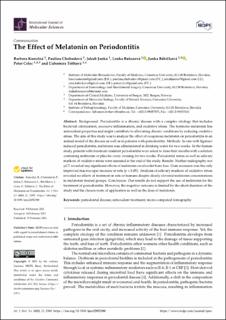The Effect of Melatonin on Periodontitis
Konečná, Barbora; Chobodová, Paulína; Janko, Jakub; Baňasová, Lenka; Babickova, Janka; Celec, Peter; Tóthová, L’Ubomíra
Journal article, Peer reviewed
Published version

Åpne
Permanent lenke
https://hdl.handle.net/11250/2830884Utgivelsesdato
2021Metadata
Vis full innførselSamlinger
- Department of Clinical Medicine [2066]
- Registrations from Cristin [9791]
Originalversjon
International Journal of Molecular Sciences. 2021, 22 (5), 2390. 10.3390/ijms22052390Sammendrag
Background: Periodontitis is a chronic disease with a complex etiology that includes bacterial colonization, excessive inflammation, and oxidative stress. The hormone melatonin has antioxidant properties and might contribute to alleviating chronic conditions by reducing oxidative stress. The aim of this study was to analyze the effect of exogenous melatonin on periodontitis in an animal model of the disease as well as in patients with periodontitis. Methods: In rats with ligature-induced periodontitis, melatonin was administered in drinking water for two weeks. In the human study, patients with treatment-resistant periodontitis were asked to rinse their mouths with a solution containing melatonin or placebo every evening for two weeks. Periodontal status as well as salivary markers of oxidative stress were assessed at the end of the study. Results: Neither radiography nor μCT revealed any significant effects of melatonin on alveolar bone loss. Gum recession was the only improved macroscopic measure in rats (p < 0.05). Analysis of salivary markers of oxidative stress revealed no effects of treatment in rats or humans despite clearly elevated melatonin concentrations in melatonin treated groups. Conclusion: Our results do not support the use of melatonin for the treatment of periodontitis. However, the negative outcome is limited by the short duration of the study and the chosen route of application as well as the dose of melatonin.
